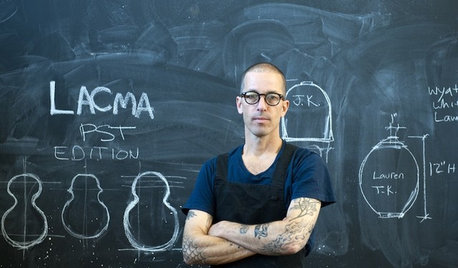Some Strange Questions...
raweseus
10 years ago
Related Stories

EXTERIORSCurb Appeal Feeling a Little Off? Some Questions to Consider
Color, scale, proportion, trim ... 14 things to think about if your exterior is bugging you
Full Story
KITCHEN DESIGN9 Questions to Ask When Planning a Kitchen Pantry
Avoid blunders and get the storage space and layout you need by asking these questions before you begin
Full Story
ORGANIZINGPre-Storage Checklist: 10 Questions to Ask Yourself Before You Store
Wait, stop. Do you really need to keep that item you’re about to put into storage?
Full Story
SELLING YOUR HOUSE15 Questions to Ask When Interviewing a Real Estate Agent
Here’s what you should find out before selecting an agent to sell your home
Full Story
FUN HOUZZDo You Dare Bring Home Some Liberace Razzle-Dazzle?
A new HBO movie highlights the ultimate showman's over-the-top bling all around the house
Full Story
GREEN DECORATING8 Questions to Help You See Through Green Hype
With the ecofriendly bandwagon picking up some dubious passengers, here's how to tell truly green products and services from the imposters
Full Story
DECORATING GUIDESStrange but True Parallels Between Early Western and Old Japanese Style
Part 1 of our 'wabi-sabi' series: in which Shaker and Arts and Crafts designs reveal simplicity, modesty and integrity
Full Story
5 Questions for Houzz Design Stars
Post Ideas for Updating an Exterior, Balancing an Off-Center Window and More
Full Story

TASTEMAKERS5 Questions for Heath's Adam Silverman
A studio director brings out-of-the-ordinary dinnerware and home accessories to Heath Ceramics' showrooms. See where he goes for inspiration
Full Story





PupillaCharites
raweseusOriginal Author
Related Professionals
Beachwood Landscape Architects & Landscape Designers · Bellflower Landscape Architects & Landscape Designers · Piqua Landscape Architects & Landscape Designers · Avocado Heights Landscape Contractors · Damascus Landscape Contractors · Essex Landscape Contractors · Fort Atkinson Landscape Contractors · Hollywood Landscape Contractors · Lemont Landscape Contractors · Middle River Landscape Contractors · Ponte Vedra Beach Landscape Contractors · Richmond Landscape Contractors · Wareham Landscape Contractors · Maplewood Landscape Contractors · Selma Landscape ContractorsPupillaCharites